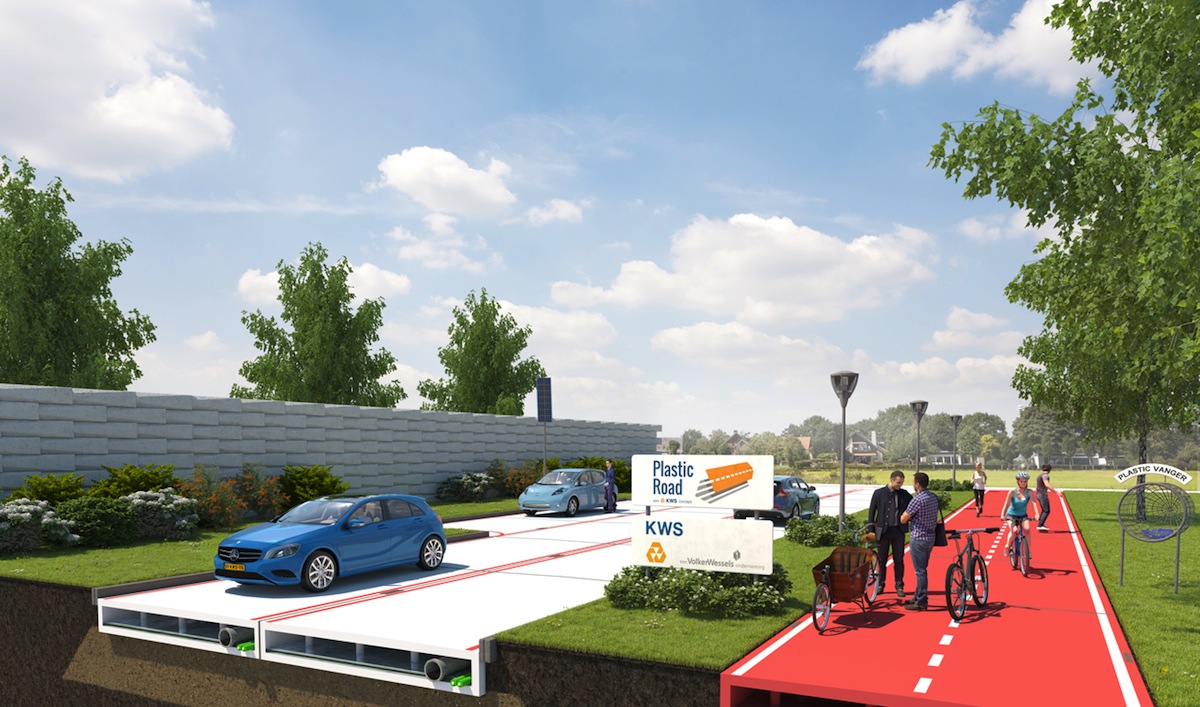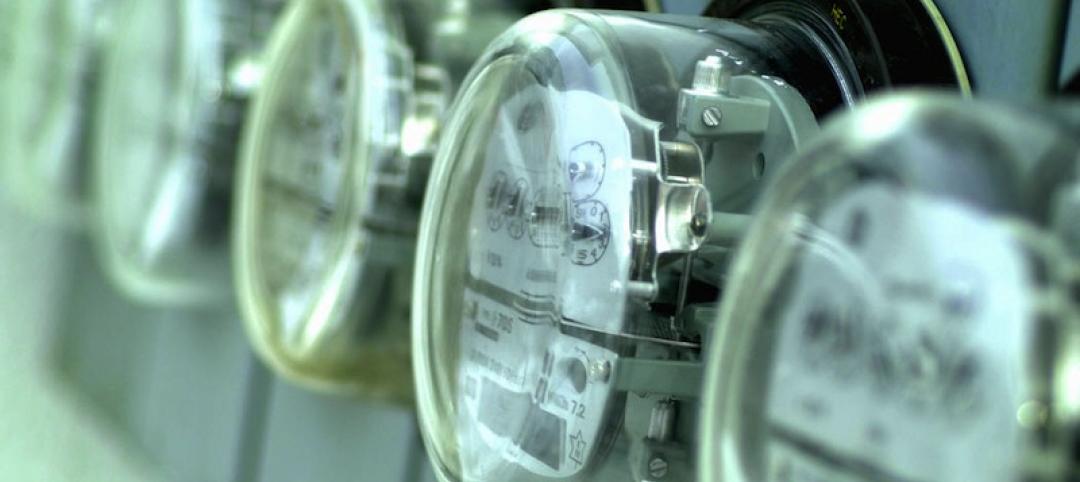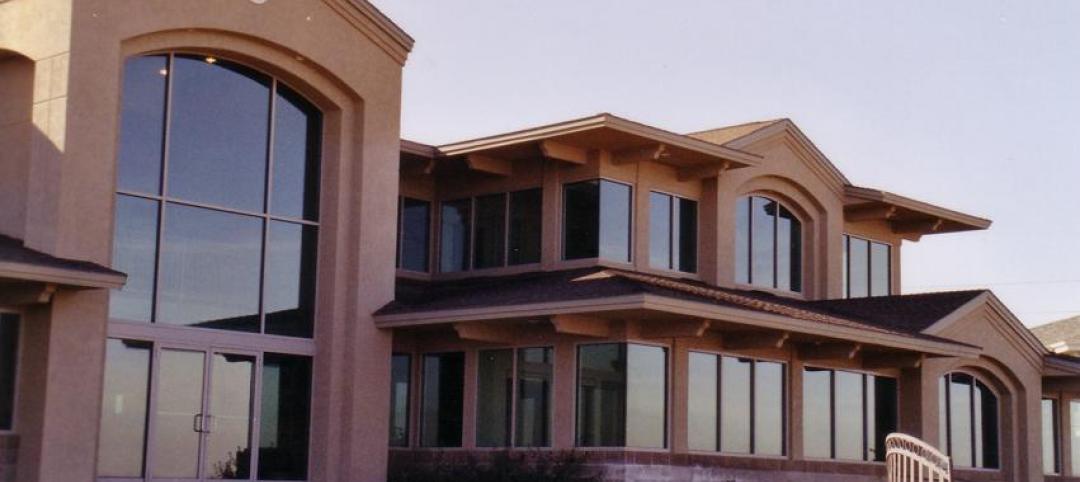All kinds of recycled waste goes into public roads these days, including blast furnace slag, scrap tires, and roofing shingles, according to the Federal Highway Administration.
An estimated 300,000 metric tons of recycled plastic are also used annually as a binder additive for public roads in the U.S. But that’s a drop in the bucket compared to the five trillion pieces of plastic junk currently floating in the oceans, to which eight million metric tons of plastic waste gets added every year.
The Netherlands is trying to take this recycling to another level, and is vying to become the first country to pave streets with materials made entirely from plastic waste.
Dutch-based KWS Infra, the roads division of VolkerWessel, is piloting a program to make roads from plastic garbage, including bags and bottles extracted from the ocean, according to Fast Company. This PlasticRoad project, which is still on the drawing board, is part of a larger initiative to rid the seas of its “plastic soup”.
Alex van de Wall, KWS’s innovation manager, says that the plastic being used would include a waste stream that normally doesn’t have high-end recycling applications and would otherwise be burned.
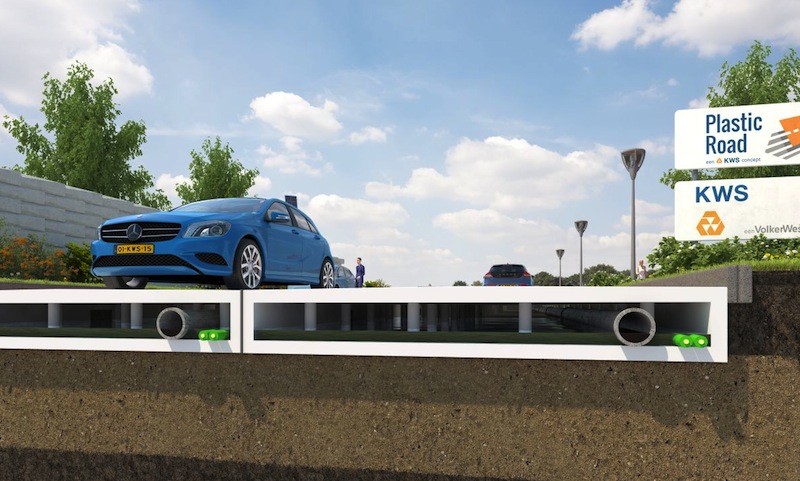
KWS sees a number of advantages to using plastic trash for roads over asphalt or concrete:
• Recycled plastic has a considerable lower carbon footprint than the production of asphalt, which accounts for 2% of global carbon emissions. Plastics can also withstand greater extremes of temperature—between -40 Celsius and 80C.
• Plastic roads could be modularized—i.e., made in factories and then snapped together in the field—so a road could be built quicker than with asphalt. KWS also claims that plastic-made roads would be far more durable and easier to maintain and repair than asphalt roads.
• Plastic could be colored white, which would help keep cities cooler and reduce what van de Wall says is the “heat island” effect caused by asphalt paving. Once this concept is translated into an actual product, “There are many options,” he says.
• When a plastic road wears out, it could be recycled again.
KWS thinks it can overcome some of the problems related to using plastic for roads, such as how the product reacts to changing temperatures and gets very hot. The company plans to test plastic roads in the lab first and then try them out at a “street lab” in Rotterdam.
“We’re very positive towards the developments around PlasticRoad,” said Jaap Peters, from that city council’s engineering department. “Rotterdam is a city that is open to experiments and innovative adaptations in practice.”
KWS is currently looking for plastic supply partners to assess the financial feasibility of its design. And if this concept pans out, the company expects to export the idea to other countries.
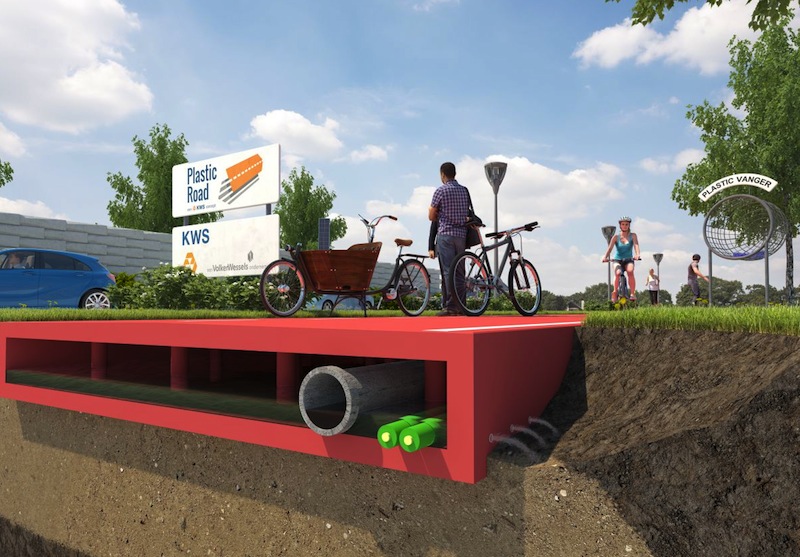
Related Stories
| Apr 2, 2013
Green building consultant explores the truth about green building performance in new book
A new book from leading sustainability, green building author and expert Jerry Yudelson challenges assumptions about the value of sustainable design and environmentally-friendly buildings.
| Apr 1, 2013
Half of building owners use 'smart' technologies, says survey
A survey of 291 building owners by IDC Energy Insights shows that 50% of owners use smart building technologies, such as HVAC controls, lighting controls, and analytics/data management.
| Mar 29, 2013
Stanford researchers develop nanophotonic panel that reflects sun's heat out of the atmosphere
Researchers at Stanford University have developed a nanophotonic material that not only reflects sunlight, but actually beams the thermal energy out of the earth's atmosphere.
| Mar 27, 2013
Small but mighty: Berkeley public library’s net-zero gem
The Building Team for Berkeley, Calif.’s new 9,500-sf West Branch library aims to achieve net-zero—and possibly net-positive—energy performance with the help of clever passive design techniques.
| Mar 22, 2013
Earn $500 as a DOE proposal reviewer
The DOE'S Building Technologies Office this morning put out a call to the AEC industry for expert reviewers for its new energy-efficiency initiative for small commercial buildings, which make up more than 90% of the commercial building stock.
| Mar 21, 2013
Best Firms to Work For: Enermodal Engineering is green to the core
At Enermodal Engineering, there’s only one kind of building—a sustainable one.
| Mar 19, 2013
New LEED for Neighborhood Development and Historic Preservation guide released
A new guidance manual, LEED for Neighborhood Development and Historic Preservation, outlines strategies geared towards helping building teams incorporate historic resources into their developments.
| Mar 14, 2013
25 cities with the most Energy Star certified buildings
Los Angeles, Washington, D.C., and Chicago top EPA's list of the U.S. cities with the greatest number of Energy Star certified buildings in 2012.
| Mar 10, 2013
Walgreens to build first net-zero energy retail store
Walgreens announced plans last week to build one of the nation's first net-zero retail stores. The Evanston, Ill., location will utilize solar panels, wind turbines, geothermal technology, LED lighting and ultra-high-efficiency refrigeration to produce energy equal to or greater than the building consumes.


